Publications (en anglais)
-
Articles scientifiques
-
Livres
-
Mémoires
Voir aussi les profiles sur
Publons,
Orcid ou
Google Scholar.
1. Articles scientifiques
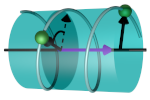 | Conformational Space of the Translocation Domain of Botulinum Toxin: Atomistic Modeling and Mesoscopic
Description of the Coiled-Coil Helix Bundle
Alexandre Delort, Grazia Cottone, Thérèse E. Malliavin, Martin Michael Müller |
Résumé
Int. J. Mol. Sci., 25: 2481, 2024.
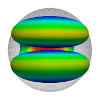 | Flexoelectric fluid membrane vesicles in spherical confinement
Niloufar Abtahi, Lila Bouzar, Nadia Saidi-Amroun, Martin Michael Müller |
Résumé
Plus d'infos
EPL, 131(1): 18001, 2020. Cf. aussi arXiv:2006.04475.
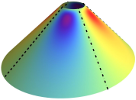 | Isometric bending requires local constraints on free edges
Jemal Guven, Martin Michael Müller, Pablo Vázquez-Montejo |
Résumé
Plus d'infos
Math. Mech. Solids, 24: 4051, 2019. Cf. aussi arXiv:1904.05855.
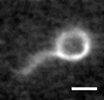 | Helical Superstructure of Intermediate Filaments
Lila Bouzar, Martin Michael Müller, René Messina, Bernd Nöding, Sarah Köster, Hervé Mohrbach, Igor M. Kulić |
Résumé
Plus d'infos
Phys. Rev. Lett., 122: 098101, 2019. Cf. aussi arXiv:1803.04691.
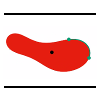 | Vesicle dynamics in confined steady and harmonically modulated Poiseuille flows
Zakaria Boujja, Chaouqi Misbah, Hamid Ez-Zahraouy, Abdelilah Benyoussef, Thomas John, Christian Wagner, Martin Michael Müller |
We present a numerical study of the time-dependent motion of a membrane vesicle in a
channel under an imposed flow. In a Poiseuille flow the shape of the vesicle depends on the flow strength,
the mechanical properties of the membrane, and the width of the channel. In a wide parameter region, the
emerging snaking shape shows an oscillatory motion like a swimmer flagella even though the flow is
stationary. We quantify this behavior by the amplitude and frequency of the oscillations of the vesicle's
center of mass. The influence of an amplitude modulation of the imposed flow on the dynamics and shape of
the snaking vesicle is also investigated. We find that this modulation---when sufficiently small---induces
a modulation in amplitude and frequency of the center of mass of the snaking vesicle. For large
modulation amplitudes transitions to static shapes are observed.
 Fermer Fermer
Phys. Rev. E, 98: 043111, 2018. Cf. aussi arXiv:1810.04500.
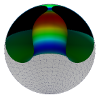 | Confining a fluid membrane vesicle of toroidal topology in an adhesive hard sphere
Lila Bouzar, Ferhat Menas, Martin Michael Müller |
Résumé
Plus d'infos
IOP Conf. Series: MSE, 186: 012021, 2017.
 | Squeezed helical elastica
Lila Bouzar, Martin Michael Müller, Pierre Gosselin, Igor M. Kulić, Hervé Mohrbach |
Résumé
Plus d'infos
Eur. Phys. J. E, 39: 114, 2016. Cf. aussi arXiv:1606.03611.
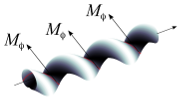 | How bio-filaments twist membranes
Julien Fierling, Albert Johner, Igor M. Kulić, Hervé Mohrbach, Martin Michael Müller |
Résumé
Soft Matter, 12: 5747, 2016.
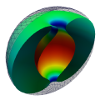 | Toroidal membrane vesicles in spherical confinement
Lila Bouzar, Ferhat Menas, Martin Michael Müller |
Résumé
Plus d'infos
Phys. Rev. E, 92: 032721, 2015. Cf. aussi arXiv:1509.00765.
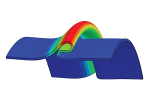 | Non-linear buckling and symmetry breaking of a soft elastic sheet sliding on a cylindrical substrate
Norbert Stoop, Martin Michael Müller |
Résumé
Plus d'infos
Int. J. Non-Linear Mech., 75: 115, 2015. Cf. aussi arXiv:1503.05030.
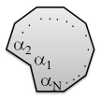 | Crunching Biofilament Rings
Julien Fierling, Martin Michael Müller, Hervé Mohrbach, Albert Johner, Igor M. Kulić |
Résumé
Plus d'infos
Europhys. Lett., 107(6): 68002, 2014. Cf. aussi arXiv:1408.6787.
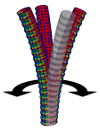 | Confotronic dynamics of tubular filaments
Osman Kahraman, Hervé Mohrbach, Martin Michael Müller, Igor M. Kulić |
Résumé
Plus d'infos
Soft Matter, 10(16): pp. 2836-2847, 2014. Cf. aussi arXiv:1312.3106.
 | Whirling skirts and rotating cones
Jemal Guven, J. A. Hanna, Martin Michael Müller |
Résumé
New J. Phys., 15: 113055, 2013. Cf. aussi arXiv:1306.2619.
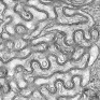 | Myotubularin and PtdIns3P remodel the sarcoplasmic reticulum in muscle in vivo
Leonela Amoasii, Karim Hnia, Gaëtan Chicanne, Andreas Brech, Belinda Simone Cowling, Martin Michael Müller, Yannick Schwab, Pascale Koebel, Arnaud Ferry, Bernard Payrastre, Jocelyn Laporte |
The sarcoplasmic reticulum (SR) is a specialized form of endoplasmic reticulum (ER) in skeletal muscle
and is essential for calcium homeostasis. The mechanisms involved in SR
remodeling and maintenance of SR subdomains are elusive. In this study, we identified
myotubularin (MTM1), a phosphatase mutated in X-linked centronuclear myopathy
(XLCNM), as a key regulator of phosphoinositide-3-monophosphate (PtdIns3P) levels at the
SR. Mtm1 deficient mouse muscles and myoblasts from XLCNM patients exhibit abnormal
SR/ER networks. In vivo modulation of MTM1 enzymatic activity in muscle using ectopic
expression of wild-type or a dead-phosphatase MTM1 protein leads to differential SR
remodeling. Active MTM1 is associated to flat membrane stacks, while dead-phosphatase
MTM1 mutant promotes highly curved cubic membranes originating from the SR and
enriched in PtdIns3P. Moreover, expression of the PtdIns3P binding module 2XFYVE also
modified the SR shape at triads. Our findings, supported by the parallel analysis of the Mtm1-
null mouse and in vivo study, reveal a direct function of MTM1 enzymatic activity in SR
remodeling and a key role for its substrate PtdIns3P in promoting SR membrane curvature in
skeletal muscle. We propose that alteration in SR remodeling is a primary cause of X-linked
centronuclear myopathy. The tight regulation of PtdIns3P on specific membrane subdomains
may be a general mechanism to control membrane curvature.
 Fermer Fermer
J. Cell Sci., 126(8): 1806, 2013.
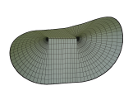 | Dipoles in thin sheets
Jemal Guven, J. A. Hanna, Osman Kahraman, Martin Michael Müller |
Résumé
Plus d'infos
Eur. Phys. J. E, 36: 106, 2013. Cf. aussi arXiv:1212.3262.
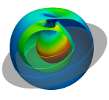 | Fluid membrane vesicles in confinement
Osman Kahraman, Norbert Stoop, Martin Michael Müller |
Résumé
Plus d'infos
New J. Phys., 14: 095021, 2012.
 | Petal shapes of sympetaleous flowers: the interplay between growth, geometry and elasticity
Martine Ben Amar, Martin Michael Müller, Miguel Trejo |
Résumé
Plus d'infos
New J. Phys., 14: 085014, 2012. Choisi pour les Highlights of 2012.
 | Morphogenesis of membrane invaginations in spherical confinement
Osman Kahraman, Norbert Stoop, Martin Michael Müller |
Résumé
Plus d'infos
Europhys. Lett., 97(6): 68008, 2012. Cf. aussi arXiv:1201.2518.
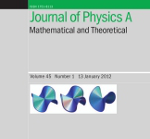 | Conical instabilities on paper
Jemal Guven, Martin Michael Müller, Pablo Vázquez-Montejo |
Résumé
Plus d'infos
J. Phys. A: Math. Theor., 45(1): 015203, 2012. Cf. aussi arXiv:1107.5008.
 | Interface-mediated interactions: Entropic forces of curved membranes
Pierre Gosselin, Hervé Mohrbach, Martin Michael Müller |
Particles embedded in a fluctuating interface experience forces and torques
mediated by the deformations and by the thermal fluctuations of the medium.
Considering a system of two cylinders bound to a fluid membrane we show that
the entropic contribution enhances the curvature-mediated repulsion between
the two cylinders. This is contrary to the usual attractive Casimir force in
the absence of curvature-mediated interactions. For a large distance between
the cylinders, we retrieve the renormalization of the surface tension of a
flat membrane due to thermal fluctuations.
 Fermer
Plus d'infos Fermer
Plus d'infos
Phys. Rev. E, 83(5): 051921, 2011. Cf. aussi arXiv:1011.1221.
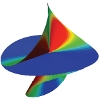 | Self-Contact and Instabilities in the Anisotropic Growth of Elastic Membranes
Norbert Stoop, Falk K. Wittel, Martine Ben Amar, Martin Michael Müller, Hans J. Herrmann |
We investigate the morphology of thin discs and rings growing in circumferential direction. Recent analytical results suggest that this growth produces symmetric excess cones (e-cones). We study the stability of such solutions considering self-contact and bending stress. We show that, contrary to what was assumed in previous analytical solutions, beyond a critical growth factor, no symmetric e-cone solution is energetically minimal any more. Instead, we obtain skewed e-cone solutions having lower energy, characterized by a skewness angle and repetitive spiral winding with increasing growth. These results are generalized to discs with varying thickness and rings with holes of different radii.
 Fermer
Plus d'infos Fermer
Plus d'infos
Phys. Rev. Lett., 105(6): 068101, 2010. Cf. aussi arXiv:1007.1871.
 | Cell Model Approach to Membrane Mediated Protein Interactions
Martin Michael Müller, Markus Deserno |
Membrane-deforming proteins can interact through the curvature
fields they create. In the case of many such proteins a cell model
approach can be used to calculate the energy per protein and
predict, whether it would lead to phase segregation or
bud-formation. Using covariant differential geometry exact results
are derived for the lateral pressure in terms of geometric
properties at the cell boundary. Numerical solutions of the exact
shape equations in the highly nonlinear regime are found and it is
seen that both phase segregation and bud formation can occur.
 Fermer
Plus d'infos Fermer
Plus d'infos
Prog. Theor. Phys. Suppl., 184: pp. 351-363, 2010.
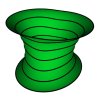 | Hamiltonian formulation of surfaces with constant Gaussian curvature
Miguel Trejo, Martine Ben Amar, Martin Michael Müller |
Résumé
Plus d'infos
J. Phys. A: Math. Theor., 42(42): 425204, 2009.
 | Local Membrane Mechanics of Pore-Spanning Bilayers
Ingo Mey, Milena Stephan, Eva K. Schmitt, Martin Michael Müller, Martine Ben Amar, Claudia Steinem, Andreas Janshoff |
The mechanical behavior of lipid bilayers spanning the pores of highly ordered porous silicon substrates was studied by local indentation experiments as a function of surface functionalization, lipid composition, solvent content, indentation velocity, and pore radius. Solvent-containing nanoblack lipid membranes (nano-BLMs) as well as solvent-free pore-spanning bilayers were imaged by fluorescence and atomic force microscopy prior to force curve acquisition, which allows distinguishing between membrane-covered and uncovered pores. Force indentation curves on pore-spanning bilayers attached to functionalized hydrophobic porous silicon substrates reveal a predominately linear response that is mainly attributed to prestress in the membranes. This is in agreement with the observation that indentation leads to membrane lysis well below 5% area dilatation. However, membrane bending and lateral tension dominates over
prestress and stretching if solvent-free supported membranes obtained from spreading giant liposomes on hydrophilic porous silicon are indented.
 Fermer
Plus d'infos Fermer
Plus d'infos
J. Am. Chem. Soc., 131(20): pp. 7031-7039, 2009.
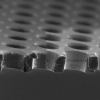 | Elasticity Mapping of Pore-Suspending Native Cell Membranes
Bärbel Lorenz, Ingo Mey, Siegfried Steltenkamp, Tamir Fine, Christina Rommel, Martin Michael Müller, Alexander Maiwald, Joachim Wegener, Claudia Steinem, Andreas Janshoff |
Résumé
Plus d'infos
Small, 5(7): pp. 832-838, 2009.
 | Conical Defects in Growing Sheets
Martin Michael Müller, Martine Ben Amar, Jemal Guven |
A growing or shrinking disc will adopt a conical shape, its intrinsic geometry characterized by a surplus angle φe at the apex. If growth is slow, the cone will find its equilibrium. Whereas this is trivial if φe≤0, the disc can fold into one of a discrete infinite number of states if φe is positive. We construct these states in the regime where bending dominates, determine their energies and how stress is distributed in them. For each state a critical value of φe is identified beyond which the cone touches itself. Before this occurs, all states are stable; the ground state has twofold symmetry.
 Fermer
Plus d'infos Fermer
Plus d'infos
Phys. Rev. Lett., 101(15): 156104, 2008. Cf. aussi arXiv:0807.1814.
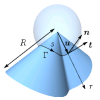 | How paper folds: bending with local constraints
Jemal Guven, Martin Michael Müller |
Résumé
Plus d'infos
J. Phys. A: Math. Theor., 41(5): 055203, 2008. Cf. aussi arXiv:0712.0978.
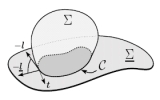 | Contact lines for fluid surface adhesion
Markus Deserno, Martin Michael Müller, Jemal Guven |
Résumé
Plus d'infos
Phys. Rev. E, 76(1): 011605, 2007. Cf. aussi cond-mat/0703019.
Choisi pour le Virtual Journal of Biological Physics Research.
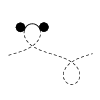 | Balancing torques in membrane-mediated interactions: Exact results and
numerical illustrations
Martin Michael Müller, Markus Deserno, Jemal Guven |
Résumé
Plus d'infos
Phys. Rev. E, 76(1): 011921, 2007. Cf. aussi cond-mat/0702340.
Choisi pour le Virtual Journal of Biological Physics Research.
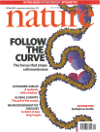 | Aggregation and vesiculation of membrane proteins by curvature-mediated
interactions
Benedict J. Reynwar, Gregoria Illya, Vagelis A. Harmandaris, Martin Michael Müller, Kurt Kremer, Markus Deserno |
Résumé
Plus d'infos
Nature 447(7143): pp. 461-464, 2007.
 | How to determine local elastic properties of lipid bilayer membranes
from atomic-force-microscope measurements: A theoretical analysis
Davood Norouzi, Martin Michael Müller, Markus Deserno |
Measurements with an atomic force microscope (AFM) offer a direct way to
probe elastic properties of lipid bilayer membranes locally: provided
the underlying stress-strain relation is known, material parameters such as
surface tension or bending rigidity may be deduced.
In a recent experiment a pore-spanning membrane was poked with an AFM tip,
yielding a linear behavior of the force-indentation curves. A theoretical
model for this case is presented here which describes these curves in the
framework of Helfrich theory. The linear behavior of the measurements is
reproduced if one neglects the influence of adhesion between tip and membrane.
Including it via an adhesion balance changes the situation significantly:
force-distance curves cease to be linear, hysteresis and nonzero detachment
forces can show up. The characteristics of this rich scenario are discussed
in detail in this article.
 Fermer
Plus d'infos Fermer
Plus d'infos
Phys. Rev. E, 74(6): 061914, 2006. Cf. aussi cond-mat/0602662.
Choisi pour le Virtual Journal of Biological Physics Research.
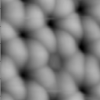 | Mechanical Properties of Pore-Spanning Lipid Bilayers Probed by Atomic Force Microscopy
Siegfried Steltenkamp, Martin Michael Müller, Markus Deserno, Christian Hennesthal, Claudia Steinem, Andreas Janshoff |
Résumé
Plus d'infos
Biophys. J., 91(1): pp. 217-226, 2006.
 | Interface mediated interactions between particles -- a geometrical approach
Martin Michael Müller, Markus Deserno, Jemal Guven |
Résumé
Plus d'infos
Phys. Rev. E, 72(6): 061407, 2005. Cf. aussi cond-mat/0506019.
Choisi pour le Virtual Journal of Biological Physics Research.
 | Geometry of surface-mediated interactions
Martin Michael Müller, Markus Deserno, Jemal Guven |
Résumé
Plus d'infos
Europhys. Lett., 69(3): pp. 482-488, 2005. Cf. aussi cond-mat/0409043.
2. Livres
-
New Trends in the Physics and Mechanics of Biological Systems
Lecture Notes of the Les Houches Summer School, vol. 92 (Oxford University Press, 2011),
éd. par Martine Ben Amar, Alain Goriely, Martin Michael Müller et Leticia Cugliandolo.
Chapitre 9 :
The physics of the cell membrane
Martin Michael Müller et Martine Ben Amar.
3. Mémoires
-
Theoretical examinations of interface mediated interactions between colloidal particles,
mémoire (2004).
-
Theoretical studies of fluid membrane mechanics, thèse de doctorat (2007).
-
Symmetry breaking in bioelasticity, thèse d'habilitation à diriger des recherches (2015).
|


